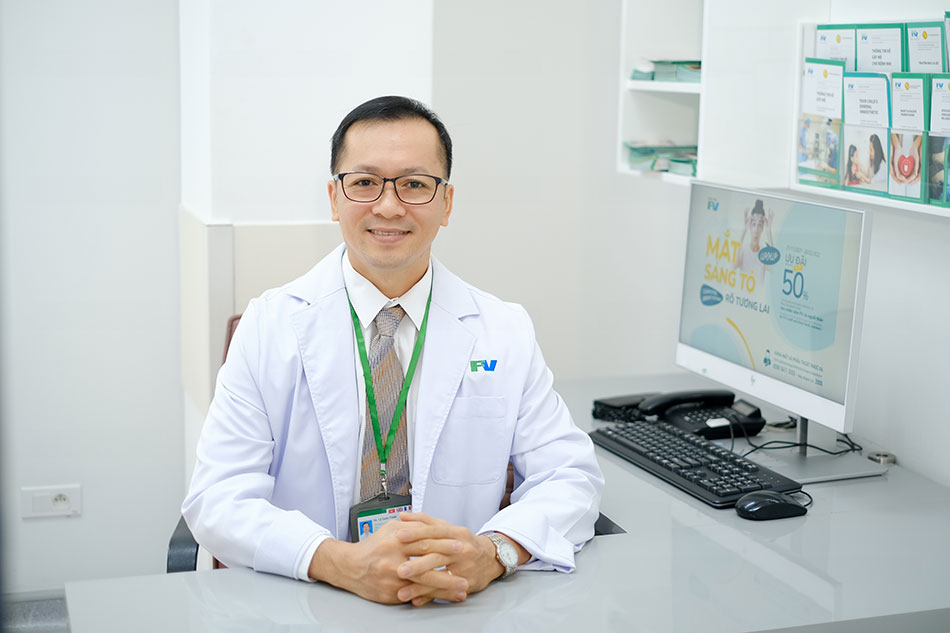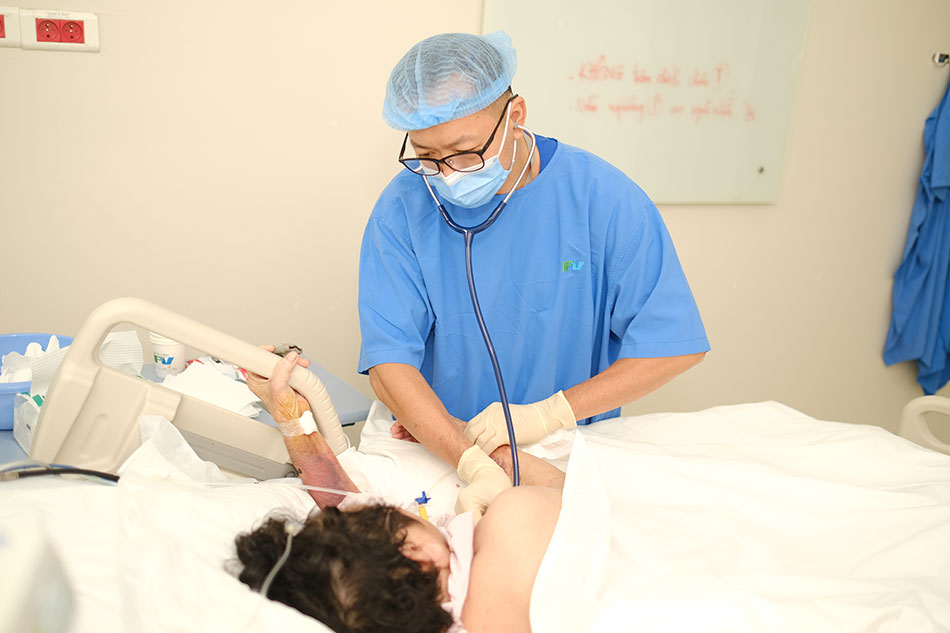Career inspiration for Ly Quoc Thinh, Head of Anaesthesiology at FV’s Intensive Care Department, resulted from an accident involving a family member which caused a great deal of pain and anger, but also made him determined to pursue medicine at Specialist Level II. Dr Thinh understands deeply that the path to following a dream is sometimes difficult, and on a personal note, on many occasions was not able to act according to his own wishes. After stepping through many doors in his career, in addition to fulfilling his dream, Dr Thinh discovered a specialty in which he finds purpose, fulfilment and enjoyment.
From the semblance of a dream to an intense passion
Dr Ly Quoc Thinh has a quiet disposition, and the way he stops, listens and focuses his full attention on the issue at hand leaves a deep impression on others. Medical staff, generally, are meticulous by nature and the ability to carefully consider every situation increases with experience and professional seniority, but Dr Thinh’s calm, meticulous and elegant demeanour has always been among his defining characteristics. “Anaesthesia-resuscitation is a job that requires high precision, and it must be said that it requires sophistication. One wrong insight, or one redundant action, can seriously affect a patient’s life,” Dr Thinh explains, noting that part of his personality is influenced by his work.

Dr Ly Quoc Thinh, Head of Anaesthesiology and Resuscitation, FV Hospital
A little over 35 years ago, Dr Thinh found himself sitting in the morgue of a hospital after a family member suffered an accident. That moment made him determined to become a surgeon so he could save other people whose lives were hanging in the balance, but ultimately many objective factors steered him to his current role: anaesthesiology resuscitation work, a core part of surgical treatment and so still partly true to his original wishes. After 25 years working in his profession, the fact that he didn’t follow his original commitment to the letter is no longer a source of regret for Dr Thinh. He shares: “At this stage in my journey, I find myself more and more passionate about the choices I have made and where I am now.”
Perhaps there are no specialties in medicine in which the patient has such limited interaction with their physician than anaesthesiology. Most patients only see anaesthesiologists very briefly during pre-anaesthesia examination, and might catch glimpses of their doctor in operating room scrubs before they’re put under, or once they’re conscious and are being monitored in recovery after surgery. The elusive nature of an anaesthesiologist’s job, where most work for the patient occurs while the patient is asleep, often creates confusion about the important role they play. However, if you ask anaesthesiologists if they’re upset by this, they’ll likely shake their head as they share the common purpose of the medical profession: saving patients. “We do our job with this sense of duty, not to be recognised by others,” says Dr Thinh, with a smile.
Elevating the “voice” of anaesthesiologists
In the 1990s, the discipline of anaesthesiology in Vietnam was not focused on development, nor did it attract many new medical school graduates. To date, while great progress has been made, the ratio of anaesthesiologists to the population in Vietnam is still low, one per 96,500 members of the population, compared to the general ratio of the number of doctors to people, which stands around one per 1,390. Many doctors in this profession, including Dr Thinh, want to contribute to the development of the industry, starting at the hospital they work at and then expanding to effect change regional and national level.

Dr Ly Quoc Thinh examines a patient at the Emergency Department, FV Hospital
He shared: “After many years in the profession, I have come to love my job more and more. When I came to FV to work and had the opportunity to study in France, my perception of anaesthesia and resuscitation and the significance of this calling have continued to evolve.”
The anaesthesia and resuscitation process at FV, as it is in France, is very strict for the safety of the patient and to minimise any risk of potential errors by medical staff. Pre-anaesthesia patient visits at FV are performed at least one day prior to surgery as Dr Thinh believes that these visits are an opportunity for the anaesthesiologist to mentally prepare the patient, explain to them the steps they will go through, and help them to feel secure now that they know who will be monitoring their condition throughout the surgery.
As a specialty, anaesthesiology requires the practitioner to have a broad medical knowledge which spans many other specialties, from internal medicine and surgery to more specific disciplines such as obstetrics, paediatrics and geriatrics. It takes a great deal of work and the constant drive to develop the knowledge and experience to be able to succeed well in this field. In addition, because anaesthesiologists must mentor and support other doctors, creating a positive working environment and offering continuous improvement training are also necessary to ensure a capable new generations of anaesthesiologists rise through the ranks.
When accepting the position of Head of Department, Dr Thinh realised that he was destined to develop the specialty of anaesthesiology and intensive care at FV. “I will continue to implement progressive policies to achieve the goals that my predecessors could not, and move this department, and FV Hospital, forward,” he stated to the faculty. In particular, his top priority is to develop the quality of human resources available at the department by encouraging doctors to study to improve their expertise, conduct self-training programs and participate in scientific research projects.
Perhaps no one will forget the striking images of the resuscitators who brought patients back from the brink of death during the ongoing COVID-19 epidemic. These professionals are used to hard work, working alone in silence, and constant stress. But as Dr Ly Quoc Thinh believes, it is only through challenges that the doctor finds passion in their work, their joy in saving people, and the spiritual fire needed to nurture succeeding generations.



